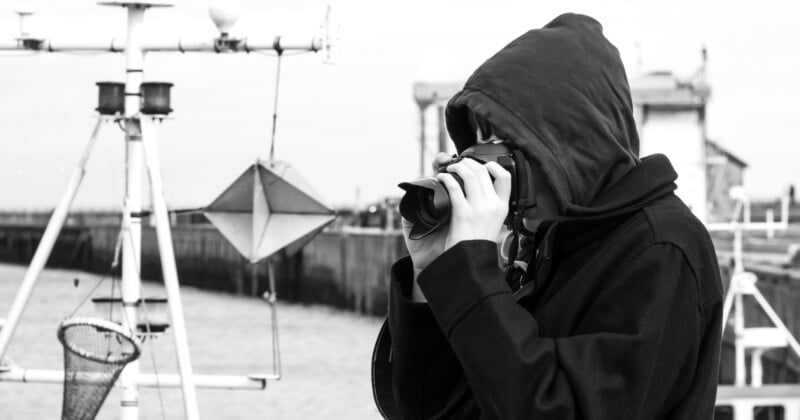Overcoming The Barriers To Making Money From Your Photography
![]() It’s getting ever more challenging to earn a living from photography. It is especially difficult to start a photography business now. So, here are some of the barriers you may meet and how to overcome them.
It’s getting ever more challenging to earn a living from photography. It is especially difficult to start a photography business now. So, here are some of the barriers you may meet and how to overcome them.
I consider myself lucky as I earn my living from photography. It’s not a profession that is going to make me rich, although it keeps the wolves from the door. Moreover, I love what I do.
However, there are pitfalls, and what I am writing here is not to put you off. Being a professional photographer is a brilliant occupation, and the rewards are worthwhile. Nevertheless, there is more to it than just being able to take a good photo. So, here are some pitfalls to be aware of.
The Experience of Setting up a Business
It was Eddie Cantor, the entertainer from the early to mid-20th Century, who first said, “It took me ten years to become an overnight success.” Getting established in photography takes time. I’ve been in business for around ten years and it is running well. I was in a fortunate financial position that allowed my wife and me to continue paying the mortgage and feed ourselves while I built my business up. Although it was sometimes scary, following this path was a risk. Consequently, I was sometimes tempted to take on paid employment, but I am glad I didn’t.
Indeed, several professional photographers I know are employed elsewhere, and photography tops up their income. However, the time spent working for their employer hinders their business from growing. Meanwhile, others have given up altogether because they find it too difficult to overcome the hurdles to success.
Not many businesses break even, let alone make a profit, in the first year. But mine did. It took hard work and long hours. Even now, I usually work from 7 am until 6 pm, and often longer; I would not have wanted to do that when I had a very young family. It’s only recently that I have allowed myself one or two full days off each week. Even then, I reply to customer emails on my days off. But those long hours were never a hardship for me because I love what I do.

Is Business Training Worth It?
Many small businesses struggle because their owners are don’t know what they don’t know. Consequently, enrolling in business training courses is worthwhile as they can provide a solid foundation of basic information that is essential learning.
There was government business startup funding available when I started. Most of that funding was ringfenced for attending training courses. Some of that training provided a qualification. However, much of it was a waste of my valuable time. It made little difference to how I operated or how my business grew. I should point out that over the years, I held various management and financial roles. I had managed teams, built websites, run accounts, and trained in quality management and customer care. So, a lot of the training offered to me was old hat. Nevertheless, I did gain some valuable information from a couple of the courses, although others were a waste of my time. Some seemed to be tick-box exercises run solely for the trainers to earn the funding to host them.
Nevertheless, attending the courses allowed me to subsequently secure some small capital grants. So, it was worth persevering with them. The best part of that training was the networking, which put me in contact with other small businesses and potential clients.
I also secured funding to get advice from business mentors. Some were excellent, while others were dross.
These days, I am very discerning about the courses I apply for, usually sticking to photography and videography training to top up my technical knowledge.
Accounting for Your Business Costs
There are both capital and revenue costs to running a business.
Capital costs apply to the tangible, expensive stuff you buy; it is necessary to invest in the right equipment to do the job properly. What do you need? You’ll likely require two pro-end cameras with twin card slots, at least two good-quality lenses, and plenty of spare memory cards. You may need flash and other lighting, plus professional tripods. Your computer and storage must also be capable of handling the images. Additionally, you’ll want screens and a calibration tool. You may need a printer. Additionally, using an ergonomic table and chair is recommended. Those are your capital costs.
![]()
Then there are the revenue costs. These are the day-to-day running expenses, such as software licenses, traveling, and printer paper and ink, to mention but a few.
When I first started my business, I did all my accounting using LibreOffice, which is free. It had everything I needed: a word processor, a spreadsheet, and a database. As the business grew, I switched to Microsoft Office because of its affordable cloud service and the facilities available in Outlook. I then bought an accounting package, which really sped up my invoicing.
Staying on top of the bookkeeping is important. I set aside extra money each month to pay the taxman. In that way, I am covered for any nasty surprises if I make a mistake (I haven’t yet). Plus, at the end of the financial year, I have a nice bonus.
Different countries’ rules vary when it comes to writing off costs against tax, so it may be worth employing an accountant. If you employ people, an accountant is essential.
Insurance
Adequate business insurance, although not a legal requirement, is absolutely essential.
It’s one of my biggest expenses, but I would not do without it.Many years ago, an insurance broker told me a heartbreaking story. A professional photographer here in the UK stepped back to frame a shot. In doing so, he knocked over a man, who fell and fractured his skull on a kerbstone. Tragically, he suffered a brain injury. His family sued the photographer for damages as the man needed medical care for the rest of his life. The photographer was insured to the tune of £1 million, about $1.3 million. That was insufficient to cover the claim, which was over £2 million. It cost the photographer his home.
Imagine being hired to photograph an event, only to have everything go wrong and all the images become lost. Then you were tasked with flying everyone in from around the world to reshoot it. That has happened and the insurance covered the costs of that.
If your home insurance covers your camera gear, it is most likely only for private use, not commercial. If you sell a couple of prints or maybe get paid for photographing a friend’s party, your insurance company may consider you to be a professional. If you were robbed or burgled and your camera and lenses were stolen, do you think the insurance will overlook these digressions? An insurance company will find any excuse not to pay you.

The Photography
If you want to make a living from photography, then you must do it well. Not only do you need to have the camera and compositional skills, but you probably need to be able to anticipate the action and be ready to capture the vital moments. You also need to learn how to use the light.
Many people are drawn to the high earnings some wedding photographers can achieve, thinking it is an easy way to make money. It isn’t. If you are doing it properly, you are spending enormous amounts of time after the wedding working on the images.
When I used to shoot weddings, each would take me about a week to work on. I needed to cull, develop and edit, create an album, and deliver the entire package to the happy couple. So, you are being paid for the week’s work, and not just the long day spent capturing the shots. Furthermore, that time has an opportunity cost; while you are editing you are not earning money from elsewhere.
There is potential to earn a lot of money doing wedding photography if you work in an affluent area and you are exceptionally good at what you do. But don’t expect it to come easily
Don’t Have All Your Eggs in One Basket
I found diversification was essential in my business. Besides photoshoots, I earn money from writing about photography, and a large chunk of my earnings comes from teaching it. When COVID-19 struck, all photography work stopped. Nevertheless, I could still write and run workshops on Microsoft Teams. Later, when the writing became less lucrative, my one-to-one courses and photography sales picked up. Being prepared for fluctuations in the market is essential.
Sometimes, you will find your work takes you in directions you didn’t expect. I used to photograph weddings, but I’ve since moved away from that genre. If you don’t enjoy doing a certain aspect of photography, there’s little point doing it as your business. It must remain fun.
Since the height of the pandemic, I’ve been commissioned to photograph an antique map that was 20 feet long, various works of art, animals, military personnel, and vehicles to name but a few.

Polish Up Your Photographic Knowledge
I always encourage people to start photographing professionally if they are keen to do so, even if it means they will be competing with me. It’s not for everyone, but nothing makes me happier than helping someone along the path to success. In the long run, I find it always brings me more work.
If you intend to teach photography, you need a very good level of technical and artistic knowledge. Like in any occupation, the more you know, the more you discover there is to learn. Consequently, I am always learning. However, some people are under the delusion that they have all the knowledge there is to know about the subject. They are invariably wrong and, inevitably, their businesses fail.
Someone once asked me whether they should start teaching photography. I asked them what exposure adjustments they would make if they were photographing a black Labrador sitting on a pile of coal and a white horse in the fog. They were stumped. I explained the answers, and they realised that they needed to improve their knowledge before embarking on their business idea. It was a year later, with my support, that they started teaching photography, and they continue to do so to this day. If they had started when they were not ready, they would have failed.
Similarly, some years ago, someone said to me they had begun running photography workshops. However, I soon started to hear complaints about them from their clients. A year later, they had stopped, partially because they lacked the knowledge to answer the questions their students asked.
There are others who have gone on to be a great success at offering photography training. They all have substantial knowledge of the art.

Don’t Give Away Your Work
Your photographs are valuable. They are the culmination of your hard work and knowledge. If you give away your time or photos for free, you are saying they are worthless. You are devaluing them and damaging the wider photographic business community. Furthermore, others will also expect to get your photos for free. Sell your work for a realistic fee. If it is good enough, people will pay.
And Finally, Be Nice
If you treat others with kindness, you will get business from them. If you don’t, they won’t want to know you.
Here are two examples:
There are a few people in this world who think they can get the upper hand by treating their competitors with contempt and trying to run them down. A case in point is a wedding photographer who lives a short train ride from me. He is constantly writing derogatory comments in photography forums about me and other professionals. Knowing photographers working in the same city, I’ve discovered he has a bad reputation there because his obnoxious behaviour isn’t limited to online comments. A few years ago, I was asked to recommend someone who lived in the same city for a lucrative wedding contract. You can guess who I didn’t recommend. Moreover, it really boosted the career of the photographer I did recommend.
Living much closer to me is an amateur photographer who regularly contributes to local photography forums. Because I live in a relatively sparsely populated county, several people I know also know him. They tell me he is constantly angry and has a reputation for bigotry. One day, he sent me an email demanding that I allow him to be a second shooter at weddings. I declined. Subsequently, he started complaining in a Facebook group I set up that professional photographers were preventing others from entering the business. Would you want someone like that at your wedding?
Treating your clients, competitors, suppliers, and community members with kindness and respect always pays off. Your reputation is everything. Don’t be put off by those who target derogatory comments at you, it only reflects badly on them, not you. The more successful you become, the more bile is likely to be thrown your way. If that’s happening, it is a good sign that you are succeeding and they are not.